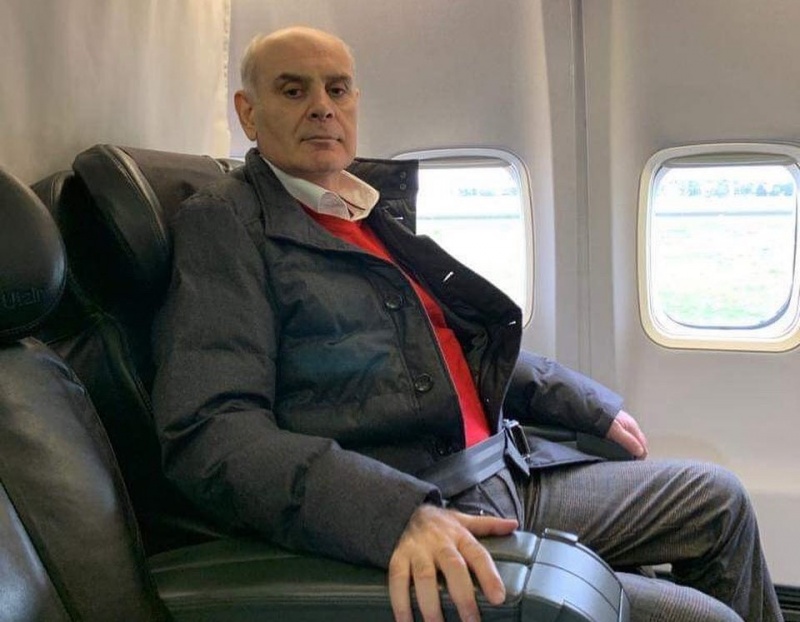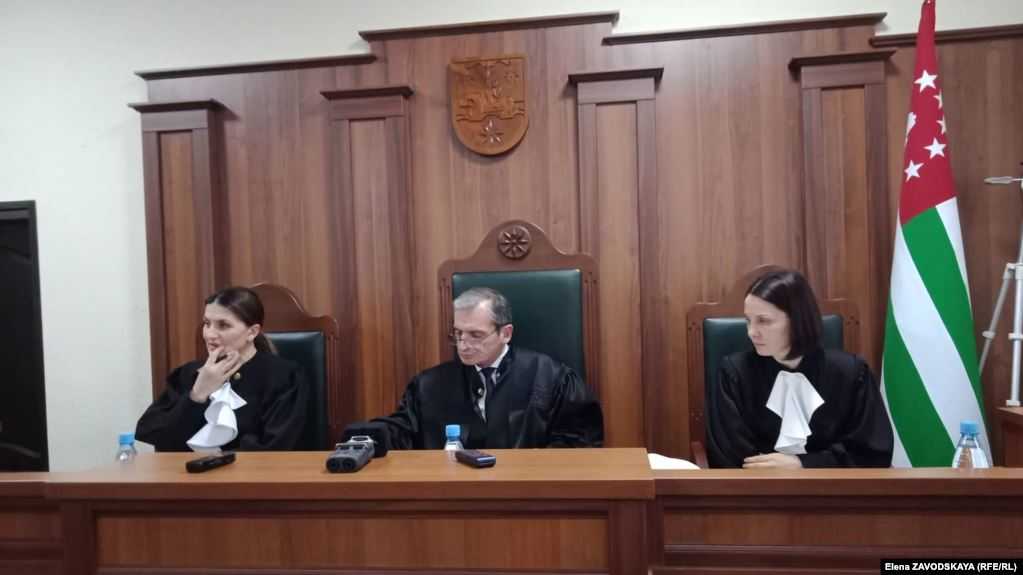Abkhazian presidential challenger vows to fight election despite ‘poisoning’


A coalition of opposition forces in Abkhazia has announced that their presidential candidate, Aslan Bzhaniya, still intends to contest the election despite claims he may have been poisoned.
Bzhaniya, who is challenging incumbent president Raul Khadzhimba in the 21 July poll, fell seriously ill on 17 April and was taken for treatment in Moscow.
In a press conference on 2 May, opposition coalition the National Movement for Protection of Statehood of the Republic of Abkhazia announced they would conduct their own investigation into Bzhaniya’s sudden illness, whose health they said was now ‘stable’.
Bzhaniya’s campaign manager, Teymuraz Khishba, told journalists during the press conference that Bzhaniya experienced ‘intense distress’ and slurred speech on 17 April, leading his family to suspect he was having a stroke.
According to Khishba, upon visiting him at his home in the Abkhaz capital Sukhumi (Sukhum) the following day, Bzhaniya was unable to speak and was only able to communicate in written form.
He said Bzhaniya was taken to Sochi, in the neighbouring Krasnodar Krai in Russia, where he underwent a CT scan, complete blood workup, ‘and other tests’. He was then transported by plane on 19 April to the Buyanov Moscow City Clinical Hospital in the Russian capital for further testing.
Konstantin Piliya, the head of the Sukhumi city assembly, told journalists on 2 May that Bzhaniya had regained some ability to use his hands and was expected to be moved out of intensive care ‘soon’.
Poisoned?
‘We won’t hide that during his tests [in the Sochi hospital], several causes of his severe malaise were considered, including the possibility of external exposure’, Khishba told journalists, reading out the opposition’s statement accounting for the deterioration of Bzhaniya’s health.
On 20 April, the Association of Doctors of Abkhazia in Moscow said that ‘as a result of comprehensive tests’ in Moscow, Bzhaniya had been diagnosed with bacterial pneumonia.
Nevertheless, the largest opposition group in Abkhazia challenging the presidency indicated they were not satisfied with the official explanation.
Khishba said during the press conference that ‘the whole of Abkhazian society was alarmed’ by the fact that Bzhaniya, ‘who led a healthy lifestyle and worked out daily […] ended up on the brink of death overnight’.
He said he ‘did not exclude’ the possibility that Bzhaniya was poisoned.
According to the opposition, security measures have been tightened in the hospital where Bzhaniya has been staying, and they are conducting their own investigation ‘with the help of experts’.
Members of the Abkhazian opposition group said they had ‘no reason to doubt’ the official diagnosis, but that they were still ‘conducting their own investigation’ into it.
Rumours of Bzhaniya’s possible poisoning intensified after two members of his security detail allegedly also fell ill.
According to RFE/RL’s Ekho Kavkaza, Khishba told journalists one of Bzhaniya’s security guards experienced ‘problems with his larynx and speech’ as well as symptoms of Bulbar palsy, a spectrum of symptoms for neurological impairment.
Sergey Shamba, the chair of opposition party United Abkhazia and a former Prime Minister of Abkhazia, also addressed rumours of poisoning during the 2 May press conference.
United Abkhazia is a member of the opposition coalition along with the Amtsakhara Party and civil society groups Abzankhara and Apsadgyl.
‘There is no doubt we have many questions about what happened. But eventually, every secret is revealed […] Unfortunately, in our society it has become commonplace for political leaders to be eliminated or there are attempts to eliminate them’, Shamba told journalists.
In her column for Ekho Kavkaza, the editor-in-chief of Abkhazian newspaper Nuzhnaya Gazeta, Izida Chaniya said that the opposition ‘voicing an unproven version of events’ regarding Bzhania’s possible poisoning could be explained by rumours that Vladislav Ardzinba and Sergey Bagapsh, the first and second presidents of Abkhazia, were also poisoned. She said that such rumours were prevalent among the Abkhazian public.
In February 2012, vice president of Abkhazia Aleksandr Ankvab survived an assassination attempt after a grenade was thrown at his house in Gudauta, killing two of his bodyguards.
Six years later a man wanted for the attack was shot dead with automatic weapons by unidentified people.
The day after the opposition group’s press conference, the press office of Abkhazian President Raul Khadzhimba put out a press release saying that ‘unsubstantiated’ statements by the opposition while there was an official diagnosis of Bzhaniya’s illness ‘could not contribute to stability in society on the eve of presidential elections’.
In the same statement, Khadzhimba’s administration said Bzhaniya’s health was personally being taken care of by Abkhazia’s health minister, Tamaz Tsakhnakiya, adding that the minister had information from his ‘Russian colleagues’ that Bzhaniya was recovering.
The Forum for the National Unity of Abkhazia, a political group allied with the incumbent president, followed suit the same day, reprimanding the National Movement for Protection of Statehood for ‘baseless’ statements aimed at ‘propping up political tensions and destabilising the situation’ in Abkhazia.
Who is Aslan Bzhaniya?
In the 2014 presidential election, Aslan Bzhaniya, a former head of Abkhazia’s State Security Service (SGB), came second after Khadzhimba, receiving 36% of the vote.
As a former ally of third president Aleksandr Ankvab, who resigned in May 2014 following opposition protests, he later said running for president was a mistake, suggesting it legitimised the elections that followed Ankvab’s resignation.
In 2015, he founded Apra, a foundation ‘studying social-economic and political issues’ in Abkhazia. Two years later, he was elected to the Abkhazian parliament, the National Assembly, and has since been widely considered one of the main challengers to Khadzhimba.
In December 2016, while entering Abkhazia from Russia through the River Psou checkpoint, Aslan Bzhaniya was detained and questioned in Sochi by Russian authorities on suspicion of illegally possessing ammunition. Released after two days, Bzhaniya and his supporting Amtsakhara opposition party accused president Khadzhimba of being behind the arrest.
In a 4 March interview with Abkhazia Inform, Bzhaniya described the current Abkhazian government as ‘unprofessional’, ‘incompetent’, and riddled by a ‘high level of corruption’.
According to the Abkhazian Election Commission, political parties and initiative groups will be able to register their candidates from 22 May.
Others that have already voiced their intention to run for president include Almas Dzhapua, a prominent critic of Abkhazia’s oil industry. Dzhapua, unlike Bzhaniya, has also opposed lifting a moratorium on the sale of real estate to foreigners, primarily, Russians.
In April 2016, a car of Dzhapua, then an MP, was blown up in Sukhumi, but he was not hurt. His allies claimed it was connected to his position on the real estate ban.
Astamur Tarba, also a former head of the Abkhazian SGB who had been absent from public life until recently has also announced he will run.
For ease of reading, we choose not to use qualifiers such as ‘de facto’, ‘unrecognised’, or ‘partially recognised’ when discussing institutions or political positions within Abkhazia, Nagorno-Karabakh, and South Ossetia. This does not imply a position on their status.









